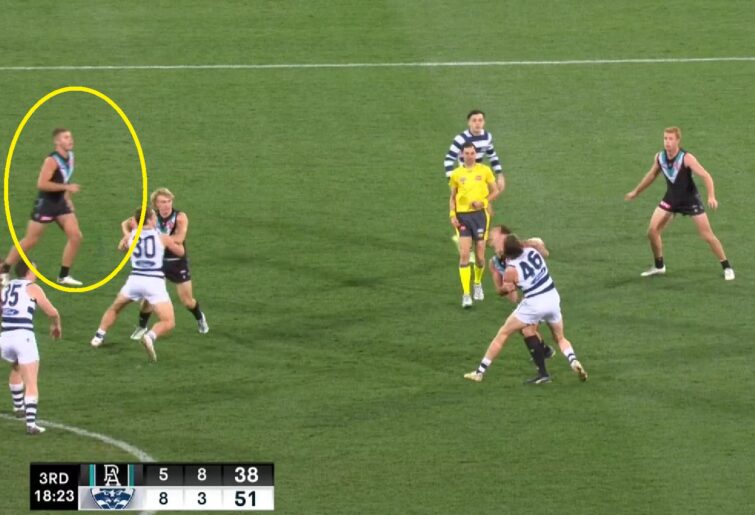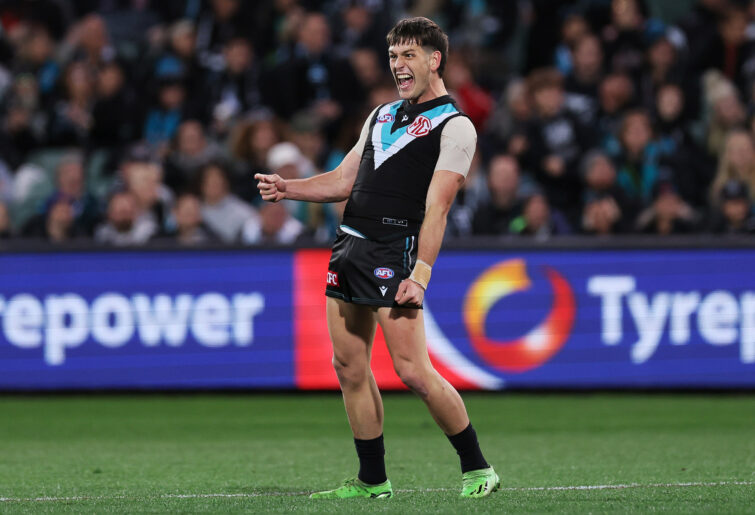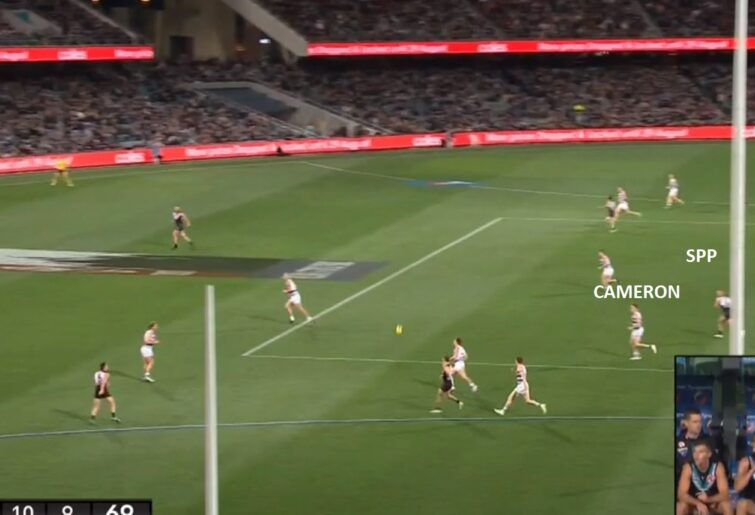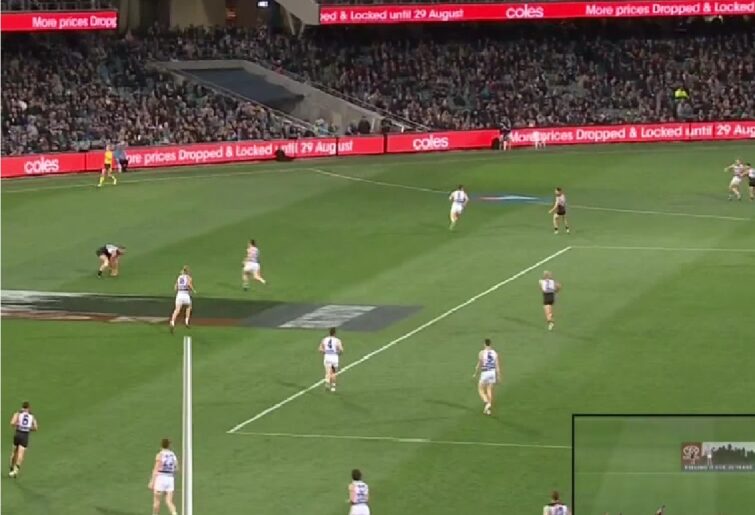I’m sure there’s a point to someone systematically analysing and dissecting the full four quarters of Port Adelaide’s stirring comeback win over Geelong on Thursday night.
But it’s also probably a waste of time. This was a match defined in totality by 869 seconds to start the third quarter at the Adelaide Oval.
It began with the Power 13 points in arrears of a Cats outfit that looked, if not comfortably the better side, then at least in control of proceedings.
It ended with Port 24 points ahead, the match, an 11th straight win, and top spot on the ladder now firmly in their keeping. Along the way, the Cats, who had done so admirably in the first half to contain the Power’s army of damaging midfielders and beat them at their own game going the other way, were made to look just as feeble, just as outclassed, as the Hawthorn outfit which came to the city of churches a fortnight ago and was dissected like a frog in the high school science lab.
Everyone has a plan until they get punched in the face, Mike Tyson once said. Port’s knockout blow was the most brutal of 2023 by a considerable distance – and it should have every other premiership contender in a cold sweat.
Let’s begin with the cold hard numbers. It’s unheard of to see the extent which the Power dominated the stats sheet to start the third term.
At one stage, following Patrick Dangerfield’s goal to extend the Cats’ lead in the early minutes, they had 24 of 25 disposals, four of them sailing through the big sticks. 10 of 11 clearances went their way – and if you’ve seen how the Power play this year, you know that they don’t mess around when they win it at the coalface.
And in attack, six marks inside 50 for the entire first half became 11 by three quarter time, four of them coming in those 14 minutes and 29 seconds which tore the match asunder. Their pressure rating in that time peaked at 254 – the AFL average is a little under 200. That’s just obscene, and reflected by the fact that, despite more than double the touches, Port also laid 22 tackles to four in this time, six of them coming inside attacking 50.
Amazing for different reasons is that it wasn’t caused by the usual suspects; Zak Butters had just four disposals during that demolition job, while Connor Rozee had a mere three. The quality of those seven touches was still sublime – they’d combined for three inside 50s all the same – but this was far from only the stars getting the job done for Port. This was as consummate and comprehensive a team domination from a position of disadvantage as we’ve seen since the fifteen minutes that won Melbourne a premiership in the 2021 grand final.
But the numbers don’t truly tell the whole story. It began with a simple, ultra-bold move from Ken Hinkley: Dan Houston, for much of this year deployed across half-back and then sweeping forward as required, was shifted right to the coalface.

This wasn’t a move to equalise a Cats’ outnumber; this was to give Port an extra man at the contest, where up until half time, an understated Geelong midfield had given them a bit of a lesson in ferocity. +5 in contested possessions and +1 in clearances might not seem like much, but the Cats had 11 extra points from stoppages, with the Power unable to wrest the ball off their precise kickers when they won it.
No sooner has Houston moved into the fray than he wins a clearance, one of six for the night – remarkable considering he still attended only the one centre bounce – to send Jason Horne-Francis into the clear. His long kick inside 50 isn’t marked, but with first a Jeremy Finlayson punch from behind then a wave of pure pressure, with tackles from Sam Powell-Pepper and Darcy Byrne-Jones, they force a ball up.
From that, Charlie Dixon thumps the ball into space near the boundary, where Powell-Pepper is lurking: he taps the ball past Mitch Duncan, runs straight past the veteran Cat who proves incapable of stopping him, does brilliantly at full pace to gather an ordinary handpass at his feet from Ollie Wines, and from the pocket, rolls through a majestic, dribbling goal through as Todd Marshall holds Jake Kolodjashnij off.
It’s a moment of magic, but one set up by pure ferocity: from the moment Houston’s handball fed a flying Horne-Francis, a score felt inevitable. The Cats had no answers for the tackling pressure, the aggressive intent, nor, in the end, the brute strength of Powell-Pepper.
It would prove a sign of things to come.
It’s Houston again who is front and centre in the next centre bounce – once more moving up to the stoppage, he mans Dangerfield at a secondary throw-up, a perfect one-armed tackle preventing the champion Cat getting a kick away as he has done so many times in his career. Next, he swoops on a loose ball with everyone else stopping for a free kick, taking the advantage without breaking stride, handpassing to Wines then running to the wing to present an option. Wines’ kick is in his direction, he gathers, and summing up his options with speed of thought, chooses to go backwards to the free man Trent McKenzie.
It was a wonderful triple-effort to beat three different Cats at three different contests, putting the ball in a better spot for his team with every one.
The Cats, as they did for much of the first half, swamped the Power from here, forcing a high, hopeful kick inside 50 that they have feasted on all night, at ground level if not in the air. This time, though, the tables are turned.
When the ball spills, it’s Byrne-Jones who is first on the ball, beating three Cats fractionally to the footy and handpassing just over the top of the onrushing Zach Tuohy, to a free Willem Drew. Suddenly, thanks only to that, the Power have an outnumber on the outside. Drew gives to the superior kick, Kane Farrell, who runs into the only space left where he can wheel onto his left foot – right up against the boundary line – and centres superbly to Jeremy Finlayson, the kick so perfect Henry never had a prayer.
From 25 metres out, it’s a simple set shot; suddenly, the Power are just a point in arrears, and with all the momentum.
If it wasn’t clear already, the next centre bounce is when Port prove the match is theirs now, and it will be all the Cats can do to merely hang in there. Mark O’Connor gathers the loose ball, and is immediately beset by Rozee. Pinning both arms in the perfect tackle under the AFL’s new guidelines, the Cat simply cannot get away a successful handball, eventually slinging the ball towards Mark Blicavs, right under the eyeballs of the umpire. Holding the ball.
As soon as Rozee gets it, he’s looking to dish off to an overlap runner – one of Port’s biggest strengths this year has been finding a way to free up such options; it’s beyond my power to quantify this stat, but the eye test says no team has dished off more handpasses after winning free kicks or marks in the central corridor than the Power.

Zak Butters. (Photo by James Elsby/AFL Photos via Getty Images)
It’s of course Houston who receives, driving the ball in long and strong – with his only free teammates running back towards the 50 rather than leading up at him, he assesses his best option is to get it in there as fast as he can, with Power jumpers everywhere goalside of their opponents. Soon, there will be an outnumber they can exploit.
Sure enough, one of those goalside midfielders, Horne-Francis, soon has the ball; lowering the eyes from 40 out rather than blazing away, he executes a pinpoint pass across, rather than forward, to Travis Boak. The only issue is that it hasn’t cleared 15 metres – no matter, though. Boak gives a handball back to Houston, who has followed his kick right to the edge of 50 in a very Nick Daicos-esque show of aggression and intent, before a superb pass clears Henry’s fingers by a matter of millimetres and hits the chest of Todd Marshall, deep in the pocket.
From centre bounce to Marshall’s chest, the Cats have not had a disposal.
Having missed more gettable shots all evening, the one-time sharpshooter retakes that title. His kick never looks like missing; the Power, having trailed all evening, have the lead barely three minutes after being 13 down.
Up comes the next bounce, the most emphatic moment of this most emphatic of periods. Scott Lycett, dominant in the ruck over part-timer Mark Blicavs, has headed off for a spell: “This might be their opportunity in the ruck now – Finlayson’s there,” Matthew Richardson wonders on Seven.
Yeah. Nah.
In fact, it’s the opposite. Blicavs, for reasons unknown, gets hands to the ball but taps it over his head, where precisely no one, teammate or otherwise, is waiting. It’s a tap tailor made for Finlayson to run onto, using his superior mobility to Lycett to become an extra midfielder the moment the ball hits the ground.
He can’t gather, but with first a tap and then a clearing kick, he both keeps the ball moving forward and forces Tanner Bruhn to tackle him, forcing a spillage but leaving his own man, Willem Drew, free. Blicavs is too far behind to impact, and Drew, perhaps anticipating a Tuohy tackle, opts to soccer the ball out of mid-air 40 metres forward.
It’s not perfect: he could easily have drawn Tuohy and handballed over to a running Josh Sinn in space. But getting it in to a suddenly red-hot bunch of forwards is a pretty decent option too.
Better still, the quick kick has taken Tom Stewart by surprise: the Cats’ prime interceptor comes dashing out of the 50, perhaps foreseeing Sinn to be the threat. He can only watch as the ball goes over his head – worse still, opponent Quinton Narkle is now goal side – and towards Mitch Duncan and Darcy Byrne-Jones.
Duncan, a fine ball-user but no one’s idea of a safe one-on-one defender, is bullocked off the ball easily by Byrne-Jones, with the Power forward now goal side. From the spillage, it’s two Cats to three Port players, and no cavalry for Geelong close enough behind the play to make that up.
Their only hope is for Sam De Koning to gather and force a ball up, but Port’s surge is playing tricks on the Cats now. He tries an ambitious tap from mid-air to Jed Bews, his only teammate anywhere near, but closing pressure from Charlie Dixon sees that tap miss him. The moment Bews can’t gather, it’s game over.
The ball spills, Byrne-Jones gathers streaming towards goal, Jed McEntee in his wake, and the Power can walk it in. Byrne-Jones chooses to shoot from 30, and it’s another one.
With 16 minutes and 20 seconds to go for the quarter, Port Adelaide had been seven points in arrears. Now, there are 14 minutes and 43 seconds on the clock, and they lead by 11.
Having dominated at the coalface for the last five minutes, the Power decide it’s time to show their wares on the rebound. From a boundary throw-in on the wing, Tom Hawkins gathers, dishing a handpass to Bradley Close. He is instantly suffocated from both sides, by Butters and Aliir Aliir, his desperate handball forward sharked by Farrell.
With ball in hand, he gives to the defensive sweeper, Trent McKenzie, who scrubs a kick forward towards Byrne-Jones. It’s not perfect, it reaches him on the bounce, and in the middle of a triangle of Cats, this is a dangerous moment for the Power.
But Farrell has kept running, anticipating correctly he might be needed again: Byrne-Jones gives him the ball flying past, and as it usually is, his left foot is immaculate. It finds, admittedly on the bounce as well, Dixon in space on the wing, but with enough time to safely gather.
As the play is unfolding, something remarkable has happened: Jeremy Cameron has slowed to a walk.
It’s something you need to see twice to truly understand; with the Power in possession at half-back, Cameron is the closest to Powell-Pepper, in dangerous space in the centre corridor.

As soon as Farrell kicks to Dixon, Powell-Pepper sprints towards goal. And Cameron’s jog becomes a walk.

I can’t help wondering whether that’s the moment which caused Chris Scott to give him a private talking-to at three quarter time.
Perhaps he thinks that Jed Bews, 10 metres ahead of Powell-Pepper and blocking up the central corridor, will take care of him. No such luck: Bews’ priority becomes heading over to try and thwart Dixon. He arrives too late, though: Dixon has gathered, with opponent Sam De Koning drawn up the ground in a high-risk-high-reward gambit to try and force a turnover with that first McKenzie kick, and he plops a simple handball over the top to Powell-Pepper.
SPP wheels, drives inside 50, and having moved the ball so swiftly from that first boundary throw-in, backwards then sideways then forwards in a perfect switch, there is space aplenty for Willem Drew to run, jump, and take a strong mark close to goal.
He kicks truly again. Goal number four of the burst.
It could have been a fifth from the next centre bounce, with Butters winning half his disposals in that period – a deft handball under pressure to Wines, who then fed him again for him to shrug a tackle, burst into space and drive the ball long.
The Cats have been broken: O’Connor has a perfect chance to intercept, leading Rozee to the ball, but he runs under the ball; even if he hadn’t, Bews, eyes only for the footy in front and with zero communication, would probably have spoiled it.
Stewart gathers and is instantly stripped by Finlayson, the ball trickles out for Rozee, who gives to Powell-Pepper, Cats tackles coming from everywhere… and the inevitable happens. Horne-Francis bends over to pick it up, and whoever was at fault for what happened next, comes up with neck directly in the path of Bews’ lunging tackle.
Only an inaccurate kick prevents yet another goal from a centre bounce without a single Geelong disposal to stop it.
All the same, it’s only a matter of time, mere minutes later, from a boundary throw-in, Zach Guthrie desperately dodges a Marshall attempted smother and whacks it as long and as wide as he can.
In normal times, it’s effective. Not here. The Power are just on fire. Miles Bergman, another shining light, takes a strong intercept mark one-on-one with Gryan Miers; he quickly turns and drives the ball back in.
Here’s where luck plays a part too: from that long ball in, De Koning and Marshall get hands on the ball almost at the same time (if anything, the Cat got their first) but the umpire, bizarrely, rules in favour of the Power tall. When it’s your day, as the saying goes.
Marshall’s snap from close range is perfect. Goal number six in the stretch. The quarter is barely half over, but the match almost certainly is.
The surge was made all the more remarkable by the evenness of the rest of the evening. The Cats responded well to that onslaught, dominating possession in the second half of the term – from a 60-30 disposal differential at the end of that brutal 15 minutes, they’d have 37 to 17 touches for the rest, kicking two goals from the resultant territory domination.
The Cats did their homework on Rozee and Butters, not giving them nearly as much space as other sides have been punished for doing in recent weeks. Their backline stood up strong against anything but the most fearsome of entries, at least until the final term when the dam wall burst. They pressured the Power into turnovers aplenty in defence, with eight first-quarter tackles letting them pepper their weak points again and again, with Gary Rohan the prime beneficiary with three opening-term goals.
Tom Hawkins kept Aliir Aliir occupied, the Power lynchpin held to just one intercept mark in the first half, and the team bought into the plan, only targeting the Tomahawk once inside 50 in that time. It was a coaching masterstroke from Chris Scott, on a night where he had a few of them.
And it did not make a damn bit of difference. Because this is no ordinary football team they’re up against. Port this year have the power, no pun intended, to lift their gears when they’re threatened, to in an instant hit a team with a sonic burst of pure brutality.
It’s going to take something special to stand up to it this year. If the Cats, the most disciplined, well-organised and resilient team of the last three years, didn’t have a prayer, than who the hell does?
































































































